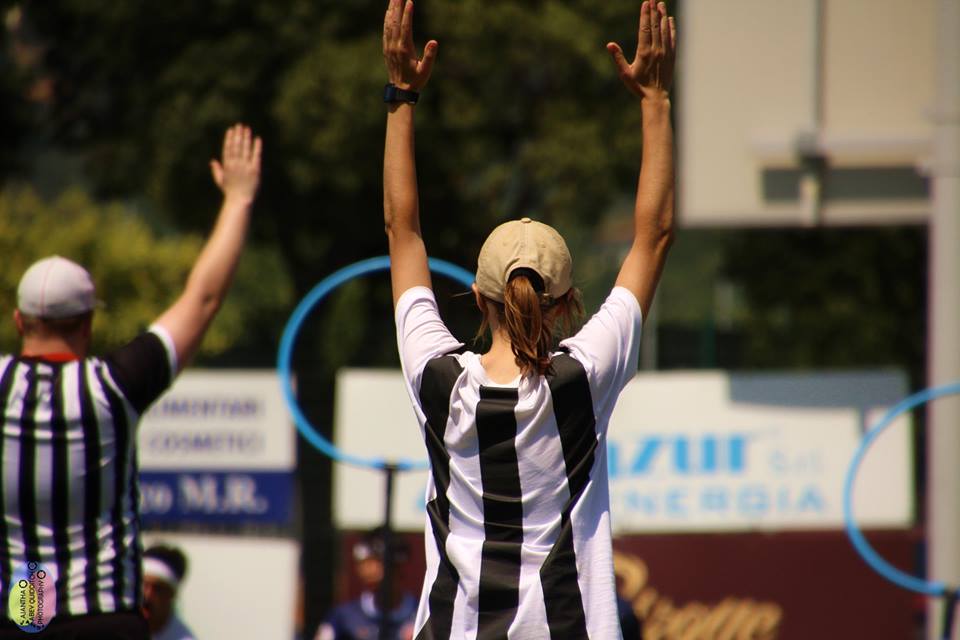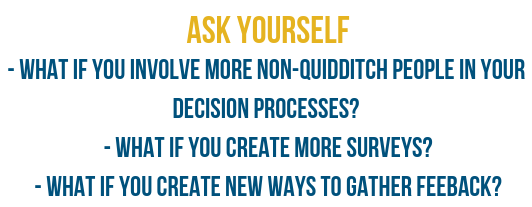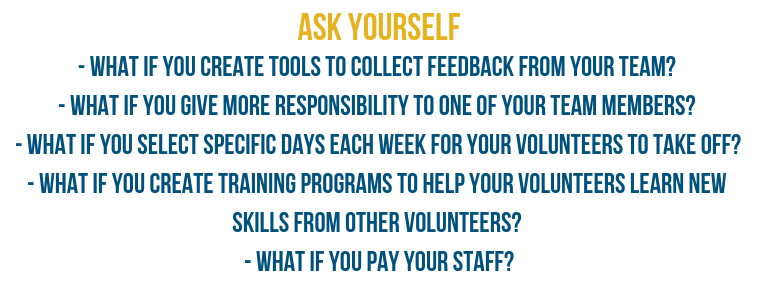- Rule, Britannia, no more?
- Unpopular Opinions: US Quadball Cup 2023
- Proven Contenders: University of Virginia
- Proven Contenders: Rutgers University
- Proven Contenders: University of Michigan
- Proven Contenders: Creighton University
- Different Perspectives: A Look Inside USA Ultimate
- Antwerp QC, Much of Belgian Core, Leaves Competitive Quidditch
The Crisis of Quidditch Adolescence

An op-ed letter to the next generation of quidditch leaders
Editor’s Note: You can find the original version of this article in French here. The below article is a U.S. adaptation, edited by The Eighth Man The views expressed in this op-ed are the opinion of the author and are not necessarily the views of The Eighth Man. The Eighth Man welcomes letters to the editor and article submissions from the general public on our website. Send your work to editors@eighthman.com. Photo credit: Ajantha Abey
Last October, Quidditch turned 13.
In the life of a human being, 13 is early adolescence. You start to notice changes in your shape–like ovals becoming rectangles. You compare yourself to your peers, asking why you are not exactly like them–why your logo doesn’t look like other leagues your age. You experience mood swings–like demanding changes in score reporting but being unwilling to contribute. Your relationships are volatile, and ever changing, people you were once close with leave and are replaced by new faces–the Quidditch Europe executive manager, Belgian Quidditch Federation president and QuidditchUK president all stepped down in the last two months.
In spite of myself, I am the latest in this unexpected and uncoordinated trend of departures.
While these actions are not as premeditated as they may seem, they are part of an overall shift in the community. And though we are all on our way out, we need to continue to support the sport as parents would their adolescent children. We are in the phase in which we will soon learn if quidditch will emerge as an actual sport or as a semi-popular activity. And if we want to emerge successful, we need new leaders to support its growth. We have entered the era of quidditch adolescence.
For the many that don’t know me in U.S., I served quidditch and its community as best I could for five years. I came from an academic and professional communications background, so it only made sense to volunteer as a communications director for the Fédération du Quidditch Français and the IQA. Throughout my quidditch career, I had the opportunity to manage several teams and to accomplish several projects that, hopefully, improved the popularity of our sport. I assisted in hosting the first Coupe de France de Quidditch. I supported local teams, providing them with resources and workshops. I oversaw the rebranding initiative in order to create a new identity for the IQA in an effort to clarify the purpose of the organization and better showcase the sport to an outside audience. I drastically changed internal communications in the IQA and worked on many ways to make this organization more reactive and aware of community’s needs.
Overall, and most importantly, volunteering as communications director helped me develop many leadership skills necessary to grow quidditch from an “adolescent” to an “adult” sport. In this piece, I’ll address my top three below.
Being a Leader Means Being Bold and Taking Risks
We all agree that quidditch–-born from fictional books, combining aspects of several sports, and featuring a diverse community of athletes and geeks alike–is an unusual sport. An unusual sport needs bold leaders.
We should rely on daring people, people who dream big. We need a vision, a purpose and above all, we need a leader who dares to think differently, dares to forecast the sport and dares to take new and uncertain initiatives to boost the development of our sport.
In my quidditch career, I took several risks. One of the biggest was applying for IQA Communications Director. At the time, I did not know I was in competition with the communications director from another NGB. He was an English-speaking native and a press relations officer. I was much less fluent in English and has much less communications experience. However, I managed to demonstrate that I was the best fit for the role with an action plan, applicable soft skills, prior management experience and a vision to drive the IQA forward. And I feel my work showed that the leaders who hired me were right to bet on the outsider.
To become an adult sport, we need to stand for causes we believe in. Let’s show how inclusive we are. Let’s show how open we are to diversity. We need to be as curious as a teenager and to try new things. Be bold. Take risks. We need to bet on the outsider.

Being a Leader Means Listening to Feedback
Feedback is key. While quidditch started on pitches, it used university exchanges and social media to move from a geek passion to a sport currently played in more than 35 nations and with over 500 teams worldwide. Our sport has come this far because we encouraged open communication between the organization and its athletes, and we will only mature further if we continue to foster a feedback loop for success.
Each piece of feedback provides a great opportunity to reconsider your work, but determining what is relevant and constructive is a delicate exercise. This is not an easy choice to make on your own, but you can ask people from your staff, your customers or third parties for advice. Each provides their own invaluable insight: Your staff has the best knowledge of the project; They should have a solid understanding of what has succeeded, and what needs to change. Your customers are the ones utilizing and experiencing your services. In the case of the IQA, these are the NGBs, teams and athletes that are reaping the benefits or experiencing the pitfalls firsthand. And, lastly, third parties–those who are unfamiliar or have minimal familiarity with quidditch–can provide you with an outside perspective. This is probably the most valuable one because it is external, and therefore unbiased. These outsiders will take a different approach, allowing you to step back and discover what might be an otherwise unexpected solution.
From August 2018 to February 2019, I led the IQA rebranding initiative. It was heavy work, that required the involvement of many people. We first launched focus groups to identify the expectations of our consumers. Then, we launched a detailed survey. Based on those insights, we hired a graphic designer and asked him to make new proposals. We spent two months going back and forth, to be sure he would come up with what we felt was the best proposal. We then asked for feedback from IQA volunteers on the final proposal.
When we were ready to release the final product, a few NGBs and IQA volunteers pushed back against the proposal. I was very confused, because I felt I had asked for feedback throughout the process. It was in this moment that the rebranding team learned that we did not create the proper environment to collect feedback. We realized a number of IQA volunteers did not realize their feedback would actually be taken into account and, thus, did not express their opinions. We also approached NGBs later in the process than we should have. After a few discussions with the aforementioned parties, we returned to the graphic designer to request additional edits. In parallel, we also asked for external feedback. Were we doing the right choice by starting the process over? Should we really change the submitted proposal? In the end, we submitted the new proposals to IQA volunteers and NGBs once again for a non-binding vote. The result was a new logo six weeks after the expected deadline. It took more time than anticipated, but we felt this final logo correctly projected our organization’s identity.
To make the best decisions, a leader need to seek out and find great advisors.

Being a Leader Means Trusting Your Team
Your team is your most valuable resource. You, individually, may have the vision, the insights and the ideas. But if you do not have someone you trust to execute these things, they will never be more than that.
How do you build the right team? Take risks. As a director, I repeated the same risk that my recruiters took when they hired me. Sometimes, I accepted uncertain applications. I was unsure whether they had the required soft skills or the time to fit their expected positions. Eventually, it was those individuals that would emerge as some of the best recruits I ever brought on. They revealed originally unnoticed abilities to handle various situations and to correctly lead their own projects. And once you have a team, you need to take care of them, not only for strategic purposes but because they are human beings spending their spare time to make your organization progress. This should be obvious, but it is crucial to keep it in mind. As a leader, it is your responsibility to make sure your volunteers are comfortable and happy. You are the shield between what could distract (or hurt) them and their motivation. And that motivation is what leads to their success, to your success and to the success of the quidditch community as a whole.
In the same spirit, resigning from my communications director position is the greatest sign of trust I could send to them: I have reached the point where they do not need my support anymore and can fly on their own. Like a parent would do for their teenager, quidditch leaders have to trust their team.. Listen to their ideas and follow their lead. They are on the ground; they are applying your action plan. They are directly in touch with issues you want to solve. Trust your team. This is the best way to let them grow.

What’s Next?
Our sport is evolving. And to go further, it needs us, the quidditch community, to foster these three ideals. Are we ready to face this new era and push forward the existing limitations of quidditch as a sport? Are we bold enough to lead it to new heights?
Yes, we are. We just simply need to do as any in late adolescence would do: keep the creativity from our inner-child while taking on the responsibility ofadults. Are we ready to mature into something exemplary?
About the author
Armand Cosseron is the former Communications Director for the IQA (2017-19) and for the Fédération du Quidditch Français (2015-17). He has been involved in quidditch since 2014.



